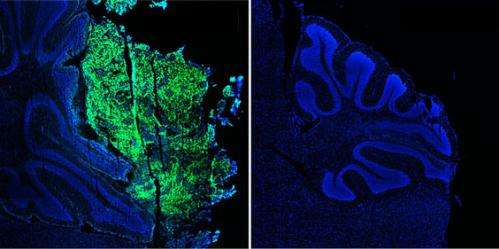For brain tumors, origins matter

(Medical Xpress)—Since stem cells and progenitor cells are regulated by different growth factors, brain tumors arising from these cells might respond differently to different therapies. Researchers at Sanford-Burnham Medical Research Institute found that basic fibroblast growth factor (bFGF) induces stem cell growth, but inhibits neuronal progenitor growth. bFGF also blocks the growth of tumors that originate from progenitors. This study suggests bFGF-like molecules might be used to treat medulloblastoma—but only tumors with the appropriate origins.
Cancers arise when a normal cell acquires a mutation in a gene that regulates cellular growth or survival. But the particular cell this mutation happens in—the cell of origin—can have an enormous impact on the behavior of the tumor, and on the strategies used to treat it.
Robert Wechsler-Reya, Ph.D., professor and program director at Sanford-Burnham Medical Research Institute, and his team study medulloblastoma, the most common malignant brain cancer in children. A few years ago, they made an important discovery: medulloblastoma can originate from one of two cell types: 1) stem cells, which can make all the different cell types in the brain, or 2) neuronal progenitor cells, which can only make neurons.
Stem cells and progenitor cells are regulated by different growth factors. So, Wechsler-Reya thought, maybe the tumors arising from these cells respond differently to different therapies…
In a study published in the journal Oncogene, he and his team show that this is indeed the case. They looked at one growth factor in particular—basic fibroblast growth factor (bFGF)—and found that while it induces stem cell growth, it also inhibits neuronal progenitor cell growth.
What's more, the researchers discovered that bFGF also blocks the growth of tumors that originate from progenitors. When they administered bFGF into a mouse model of medulloblastoma, it dramatically inhibited tumor growth.
Although bFGF itself can't be used as a drug (it would cause too many off-target effects), this study suggests that molecules like it might be used to treat medulloblastoma—but only for tumors that have the appropriate origins.
"Medulloblastomas are not all alike, and the same is true for cancers of the breast, prostate and other tissues. It's critical for us to figure out how tumors differ from one another, so we can find ways to personalize cancer diagnosis and come up with treatments that are more effective and less harmful," Wechsler-Reya says.
More information: Emmenegger BA, Hwang EI, Moore C, Markant SL, Brun SN, Dutton JW, Read TA, Fogarty MP, Singh AR, Durden DL, Yang C, McKeehan WL, & Wechsler-Reya RJ (2012). Distinct roles for fibroblast growth factor signaling in cerebellar development and medulloblastoma. Oncogene, PMID: 23045271. www.ncbi.nlm.nih.gov/pubmed/23045271
















